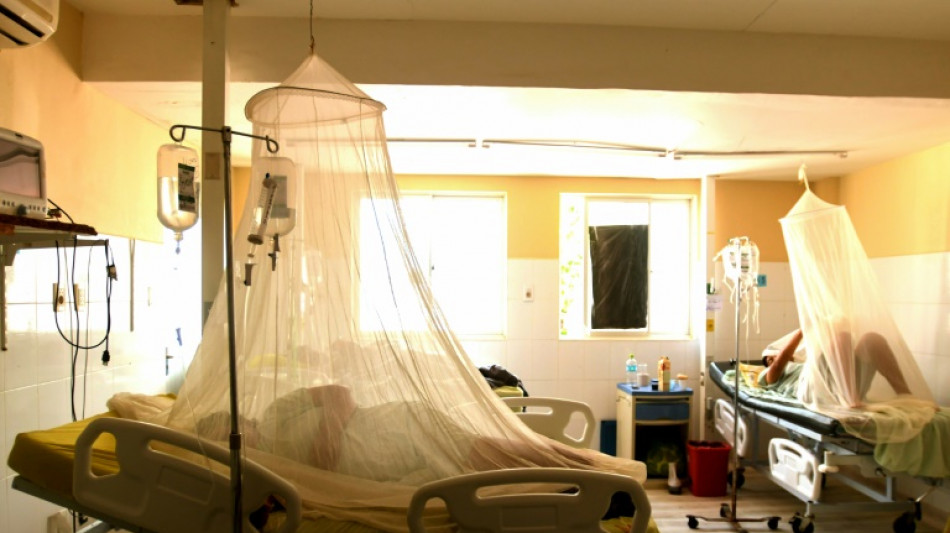
-
 Toothless Liverpool held by Leeds
Toothless Liverpool held by Leeds
-
Dozens killed as fire ravages Swiss ski resort New Year party

-
 K-pop stars BTS to release album in March ahead of world tour
K-pop stars BTS to release album in March ahead of world tour
-
Fresh clashes kill six in Iran cost-of-living protests

-
 Nigeria kicks off new tax regime vowing relief for low earners
Nigeria kicks off new tax regime vowing relief for low earners
-
Dozens killed in fire at Swiss ski resort New Year party

-
 Leftist Mamdani begins first day as New York mayor
Leftist Mamdani begins first day as New York mayor
-
Dozens believed killed in fire at Swiss ski resort New Year party

-
 Brazil Supreme Court rejects Bolsonaro request for house arrest on health concerns
Brazil Supreme Court rejects Bolsonaro request for house arrest on health concerns
-
Israel confirms ban on 37 NGOs in Gaza

-
 Russia blames Ukraine for deadly New Year drone strike
Russia blames Ukraine for deadly New Year drone strike
-
Coach Maresca leaves Chelsea - club

-
 'Several dozen' believed killed in fire at Swiss ski resort New Year party
'Several dozen' believed killed in fire at Swiss ski resort New Year party
-
China's BYD logs record EV sales in 2025

-
 Yemen separatists say Saudi-backed forces to deploy in seized territories
Yemen separatists say Saudi-backed forces to deploy in seized territories
-
Wales rugby star Rees-Zammit signs long-term deal to stay at Bristol

-
 'Several dozen' believed killed in fire at Swiss ski resort New Year bash
'Several dozen' believed killed in fire at Swiss ski resort New Year bash
-
Hakimi, Salah and Osimhen head star-packed AFCON last-16 cast

-
 Israel says it 'will enforce' ban on 37 NGOs in Gaza
Israel says it 'will enforce' ban on 37 NGOs in Gaza
-
Near record number of small boat migrants reach UK in 2025

-
 Several dead as fire ravages bar in Swiss ski resort town Crans Montana: police
Several dead as fire ravages bar in Swiss ski resort town Crans Montana: police
-
Tsitsipas considered quitting tennis during injury-hit 2025

-
 Sabalenka wants 'Battle of the Sexes' rematch and revenge
Sabalenka wants 'Battle of the Sexes' rematch and revenge
-
Osaka drawing inspiration from family at United Cup

-
 Leftist Mamdani takes over as New York mayor under Trump shadow
Leftist Mamdani takes over as New York mayor under Trump shadow
-
Israel's Netanyahu among partygoers at Trump's New Year's Eve fete

-
 Champagnie, Wemby lead Spurs comeback in Knicks thriller
Champagnie, Wemby lead Spurs comeback in Knicks thriller
-
Eight dead in US strikes on alleged drug boats: US military

-
 Trump joins criticism of Clooney's French passport
Trump joins criticism of Clooney's French passport
-
AI, chips boom sent South Korea exports soaring in 2025

-
 Taiwan's president vows to defend sovereignty after China drills
Taiwan's president vows to defend sovereignty after China drills
-
N. Korea's Kim hails 'invincible alliance' with Russia in New Year's letter

-
 In Venezuela, price of US dollar up 479 percent in a year
In Venezuela, price of US dollar up 479 percent in a year
-
Cummins, Hazlewood in spin-heavy Australia squad for T20 World Cup

-
 Ex-boxing champ Joshua discharged from hospital after fatal car crash
Ex-boxing champ Joshua discharged from hospital after fatal car crash
-
Kamenar to Open for Tom Hamilton of Aerosmith's New Band Close Enemies at the World-Famous Whisky a Go Go - January 3, 2026

-
 SUPCASE Unveils Its 2026 Brand Evolution: Lighter in Form, Stronger in Purpose
SUPCASE Unveils Its 2026 Brand Evolution: Lighter in Form, Stronger in Purpose
-
The EPOMAKER RT82: Where Retro Meets Modern Technology

-
 Zelensky says deal to end war '10 percent' away
Zelensky says deal to end war '10 percent' away
-
Trump bashes Clooney after actor becomes French

-
 We are '10 percent' away from peace, Zelensky tells Ukrainians
We are '10 percent' away from peace, Zelensky tells Ukrainians
-
Trump says pulling National Guard from three cities -- for now

-
 Ivory Coast top AFCON group ahead of Cameroon, Algeria win again
Ivory Coast top AFCON group ahead of Cameroon, Algeria win again
-
World welcomes 2026 after a year of Trump, truces and turmoil

-
 Ivory Coast fight back to pip Cameroon for top spot in AFCON group
Ivory Coast fight back to pip Cameroon for top spot in AFCON group
-
Second Patriots player facing assault charge

-
 Trump-hosted Kennedy Center awards gala ratings plummet
Trump-hosted Kennedy Center awards gala ratings plummet
-
Israel begins demolishing 25 buildings in West Bank camp

-
 Cambodian soldiers freed by Thailand receive hero's welcome
Cambodian soldiers freed by Thailand receive hero's welcome
-
Sudan lose to Burkina Faso as Algeria win again at Cup of Nations

| SCS | 0.12% | 16.14 | $ | |
| BCC | -0.26% | 73.6 | $ | |
| RBGPF | -0.37% | 80.75 | $ | |
| AZN | -0.63% | 91.93 | $ | |
| RYCEF | 0.13% | 15.51 | $ | |
| RIO | -0.61% | 80.03 | $ | |
| NGG | -0.54% | 77.35 | $ | |
| BCE | 1.05% | 23.82 | $ | |
| GSK | -0.53% | 49.04 | $ | |
| BTI | 0.12% | 56.62 | $ | |
| CMSC | -0.15% | 22.65 | $ | |
| JRI | 0.22% | 13.61 | $ | |
| VOD | -0.15% | 13.21 | $ | |
| RELX | -1.71% | 40.42 | $ | |
| CMSD | 0.09% | 23.15 | $ | |
| BP | -0.06% | 34.73 | $ |

Climate change spurring surge in dengue, chikungunya: WHO
The World Health Organization warned Wednesday that dengue and other diseases caused by mosquito-borne arboviruses were spreading far faster and further amid climate change, warning global outbreaks could be looming.
Experts with the United Nations health agency sounded the alarm over swelling numbers of cases of dengue and chikungunya, and warned new epidemics of zika could also be expected.
All three are caused by arboviruses carried by Aedes aegypti mosquitos, which have been spreading into new territory as the planet warms.
"Climate change has played a key role in facilitating the spread of the vector mosquitoes," said Raman Velayudhan, who coordinates WHO's dengue and arbovirus initiative.
He and colleague Diana Rojas Alvarez, WHO's technical lead on chikungunya and zika, stressed the need for urgent action to rein in the spread of the mosquitos, amid fears of larger outbreaks in new areas.
A full 129 countries are already at risk from dengue, including 100 countries where the disease is endemic.
And case numbers have grown exponentially in recent years, jumping from around half a million in 2000 to some 5.2 million in 2019, the worst year on record, Velayudhan told reporters.
Cases were not properly recorded during the Covid pandemic, but he warned that numbers remained high.
In parallel, chikungunya, which to date has been reported in 115 countries since it was discovered in the 1950, is experiencing a dramatic surge in the Americas, Rojas Alvarez told reporters.
So far this year, around 135,000 cases have been reported there, compared to 50,000 cases reported during the first half of 2022, she said.
- 'Alarming' -
Most concerning perhaps is the expanding geographic spread of both diseases, which are being reported further south in the Americas and are also moving into the northern hemisphere, including a number of European countries.
"The mosquitos and these diseases have with climate change been increasing ... by altitude and by latitude," Rojas Alvarez said, describing the situation as "alarming".
"This high transmission (in the Americas) could be an anticipation of what the next summer season in the northern hemisphere might look like," she warned.
The two diseases often cause just mild symptoms like fever, body ache and a rash.
But while most people who catch chikungunya experience symptoms for about a week, a full 40 percent will feel the effects for months and even years.
"It can cause lifelong disability," Rojas Alvarez warned.
With dengue, which comes in four closely related serotypes, people who are reinfected with another serotype often develop severe disease.
This "can lead to organ failure and death", Velayudhan warned, adding that "this is a big threat to the world, because most of the countries now have all four serotypes in circulation."
He called for countries to boost mosquito control and "be on the alert" to detect when the diseases are spreading.
"We really want to avoid any major outbreak."
B.Finley--AMWN



